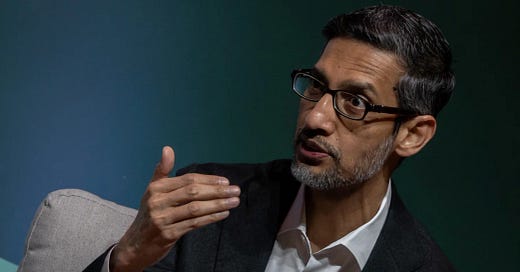Google Tightens the Remote Work Leash
Plus, how hybrid and remote work are reshaping competition with Raj Choudhury
👋 Happy Tuesday! The European Central Bank is extending its hybrid work policy for another two years, allowing staff to work remotely for up to 110 days annually (90 days anywhere in the EU and 20 days outside). The policy has been remarkably successful, with 95% of staff taking advantage of remote work options last year, averaging 57 remote workdays per employee.
In this week’s edition:
🏢 Google Ups RTO Pressure
📊 Flexibility Changes in Tech
🏡 How Flexibility is Reshaping Competition
Current Subscribers: 8,483
Please forward to colleagues and friends! Link to subscribe.
THIS WEEK’S FLEX FOCUS 🔍
Google Tightens the Remote Work Leash
Google is intensifying pressure on remote workers, with multiple units informing staff they must return to in-person work three days weekly or potentially lose their positions.
The tech giant, which has been strategically reducing headcount while heavily investing in AI initiatives, is framing the decision around the importance of in-person collaboration for innovation and problem-solving.
This policy shift affects several departments, including Google Technical Services and People Operations, with some employees being offered relocation expenses if they live within 50 miles of an office. For others, voluntary buyouts appear to be the only alternative to returning in person.
FLEX WORK QUICK HITS 💥
Stay ahead of the curve with our curated roundup of the trending flexible work stories making waves right now. Here's what you need to know 👇
SF Gate: Intel's new CEO increases in-office requirement from three to four days weekly starting September, noting current hybrid policy compliance has been "uneven at best”.
Business Insider: Honda announces US staff must return to the office at least 80% of the time by October 2025.
Fast Company: Hybrid work can make conflict harder to detect and address, requiring leaders to proactively create communication opportunities that would naturally occur in office settings.
WorkLife: Remote workers looking to build intentional presence in RTO environments can connect through proactive engagement, personal work style sharing, and meaningful conversations.
STAT OF THE WEEK 📈
Fully Flexible Changes in the Tech Industry
As we explored last year, there has been a significant shift in flexible work policies among Tech companies from June 2023 to June 2024. At the time, Employee's Choice was the most common policy type, with 56% of Tech firms having an Employee's Choice model, followed by 23% being Fully Remote (no offices at all).
While 23% is a higher percentage of Fully Remote firms compared to any other industry, that percentage is down significantly from June 2023. In June 2023, 37% of Tech companies were Fully Remote and 38% were Employee's Choice.
FLEXPERT INSIGHTS 🧠
Office Vibing: The Antidote to Office Mandates
Moving beyond mere office mandates, Phil Kirschner envisions a world where employees follow their moods and meetings rather than rigid corporate policies. He distinguishes between a space's inherent "vibes," deliberately designed "vibrancy," and the behavioral freedom of "vibe officing."
As power shifts from organizations to individuals, Phil challenges companies to create magnetic environments that employees genuinely want to visit instead of forcing attendance.
PODCAST SPOTLIGHT 🎙️
How Hybrid and Remote Work Are Reshaping Competition
In this interview with Harvard Professor Raj Choudhury, author of "The World Is Your Office," Brian Elliott explores groundbreaking research on workplace flexibility and its impact on organizations, talent, and economic development.
Key takeaways:
What "Work From Anywhere" truly means and how it differs from simply working from home.
How the U.S. Patent Office achieved a 4.4% productivity increase while expanding their talent acquisition nationwide.
Why over 55 countries and 45 U.S. heartland cities are now competing for remote workers with special incentives.
COMPANY SPOTLIGHT ✨
The Options Clearing Corporation (OCC), founded in 1973, is the world's largest equity derivatives clearing organization, committed to promoting stability and financial integrity in the marketplace. The company’s mission is to provide secure, efficient, and cost-effective clearing, settlement, and risk management services. Headquartered in Chicago, Illinois, it has additional offices in Dallas, Texas, and Washington, D.C.
ONE MORE THING 1️⃣
Add your company to Flex Index
Follow Flex Index on LinkedIn
Share this newsletter with friends and colleagues








